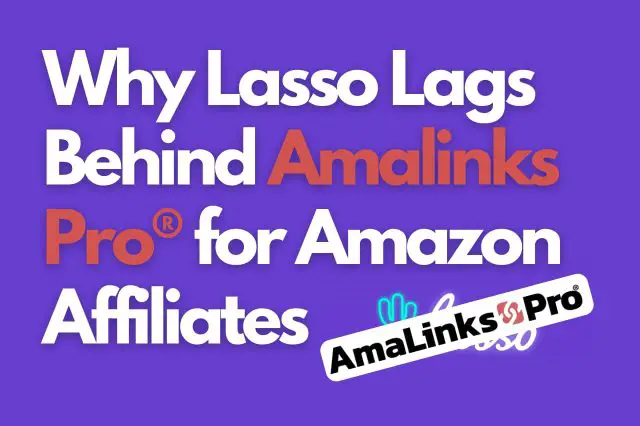Ever wondered just what a blogger is and what a professional blogger actually does every day? Are you also curious to know exactly what the difference is between a hobby blogger and a professional blogger? Well, you’re in the right place.
This post will explain to aspiring bloggers what kinds of things they’ll be spending their time doing, as well as offer advice to existing hobby bloggers to help them understand and take the next steps to becoming professional bloggers…
What is a Blogger – in Simple Words?
A blogger is a person who writes online blog posts. Collectively, those individual blog posts form a ‘blog’ – a section of a website dedicated to written content. This content is created to inform, engage and excite readers who are looking for an answer to a specific search query.
Some bloggers write content about a wide variety of subjects (differencebetween.com) looking to rank for search queries that answer questions without attempting to dominate a certain niche subject matter or attract a specific audience.

Other bloggers create content that targets a very specific topic and they will look to build blog content around that particular subject (kitchenknifeplanet.com for example).
For a new blogger, this is the best route. With the right keyword research strategy, it’s faster for a new blogger to gain some topic authority within a certain niche. And as topic authority grows, your site will attract more organic traffic from search engines.
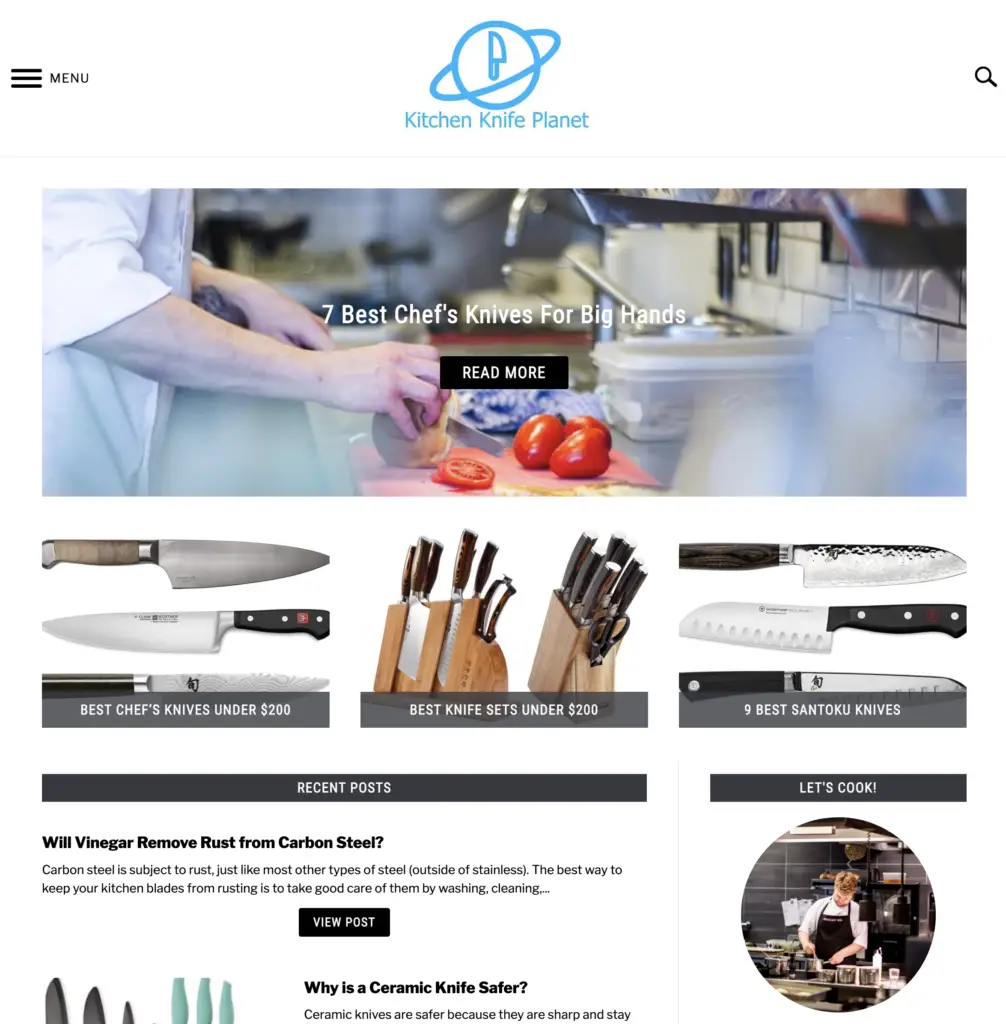
It’s worth mentioning two other terms here – vlogger and podcaster.
So, What is a Vlogger?
A vlogger is someone who creates videos to engage with an audience on a specific topic. Whereas a blogger spends their time writing blog content, a vlogger will solely focus on making videos.
And What is a Podcaster?
A podcaster is someone who creates a series of audio episodes that collectively form a podcast. Typically honing in on a specific niche, a podcast is very similar to a blog, the difference being that the content is in audio form rather than the written word.
What Is A Blog? 3 Awesome Examples from Successful Bloggers
So, now we know what a blogger is, it’s time to dig a little deeper and shed some light on the different types of blogs there are, and how they each make money. Knowing this will help us to understand how bloggers actually spend their time.
Affiliate blog
A blogger who adopts an affiliate marketing model will harness the great power of content marketing to recommend products to their target audience.
Readers will click through to the product pages using a special embedded link – also called an affiliate link. These links will generate a commission for the referrer if that reader then goes on to make a purchase.
Affiliate bloggers will spend their time:
- researching keyword phrases
- writing product reviews
- writing supporting non-affiliate content
- developing affiliate strategies with relevant companies within their niche
Amazon has a great affiliate program, and it’s really easy to get started with. For more on this head over to our post on how to make money with Amazon Associates.
When it comes to affiliate bloggers, DC Rainmaker is one of the best. The incredible depth and thoroughness of each and every review on this site are staggering. And this is the level of usefulness a blogger needs to bring to the niche they chose to write within.
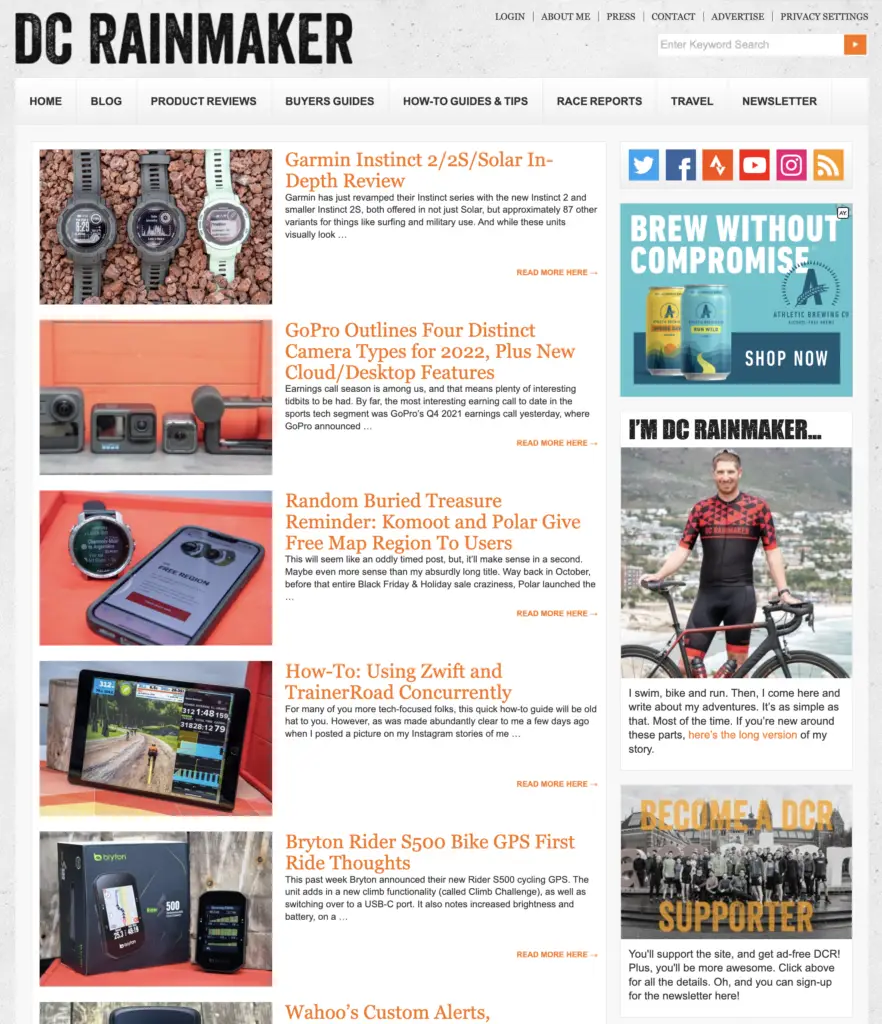
Done well an affiliate blog can make a lot of money for a blogger. Check out our Affiliate Marketing for Beginners guide for more tips.
Informational Blog
Whereas affiliate blogs tend to be more product-focused, informational blogs answer more non-product-related questions that web users have.
Bloggers using this model may well include a few affiliate links here and there, but they are more likely to generate income selling ad space on their site.
Ad networks (like Google Adsense or Mediavine) will happily pay a blogger a certain amount of money per click (PPC), or per 1000 page views (earnings per 1000 visitors, also known as EPMV).
Bloggers who can attract a lot of traffic to a site can generate huge amounts of money this way.
As such, bloggers using this model will spend their time:
- doing keyword research to find relevant questions to write articles for
- writing those SEO-tailored posts
- crafting adverts for use on social media platforms like Facebook to drive more traffic to a site
A good example of an info site blog is petkeen.com where pet owners can find answers to hundreds of pet-related queries. Display ads are liberally used within pages and posts to generate earnings for the site.
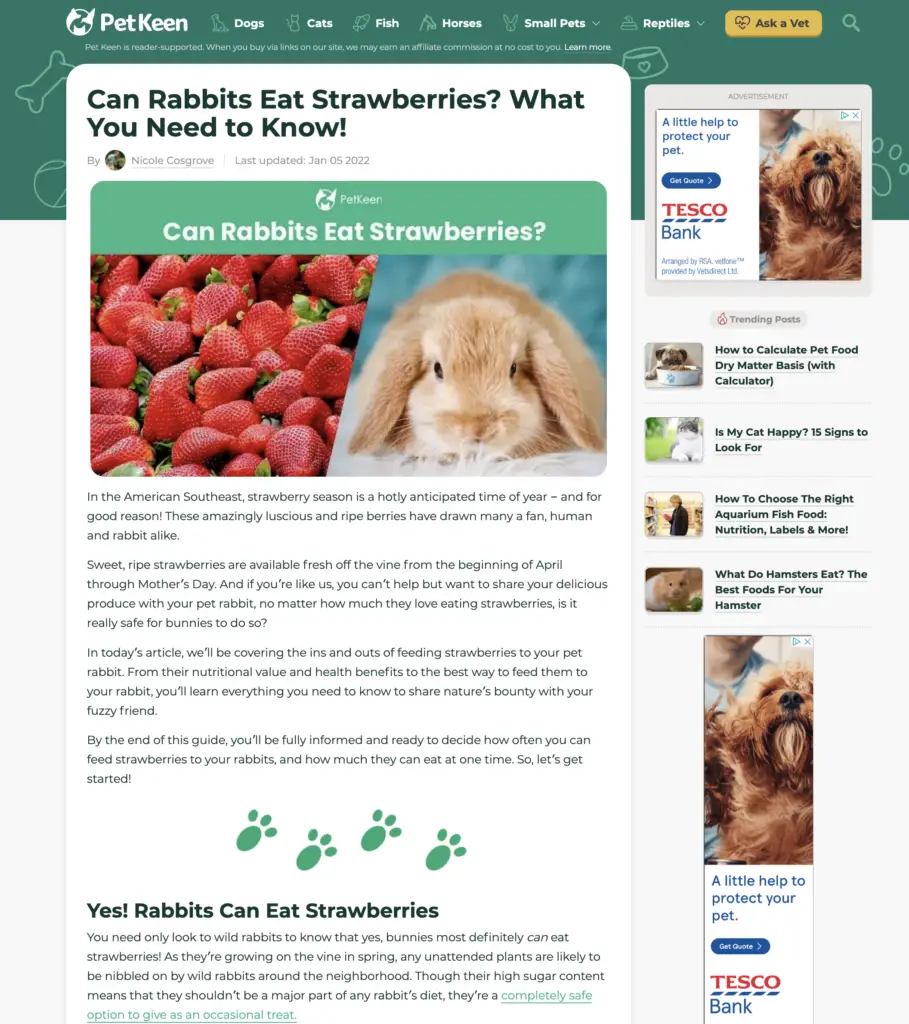
Business Blog
Many companies have now awoken to the fact that content marketing makes money. And a business blog is the simplest way for a brand to engage directly with its customers.
Velocitize sum up why a company blog is important:
A chief reason every company needs a blog is to increase their visibility. Put simply, the more blog content you create, the more opportunities you’ll have to show up in search engines and drive organic traffic to your website. Blogs provide the perfect platform to strengthen your SEO strategy.
A lovely example is the British urban and outdoor bag company, Stubble&Co. This is a great example of a business blog that is both stylish and well-written.

Hobby Bloggers vs Professional Bloggers
Many people start their first blog as an online diary tracking a particular thing they’re doing with their life.
That’s how I started out, talking about ultra running and endurance sports as a way to chronicle my personal journey and help others wanting to do the same. When I was doing that I would definitely describe myself as a hobby blogger.
But then I started to wonder if I could monetize my blog in some way and discovered Darren Rowse and the ProBlogger podcast. This was when I started to take blogging seriously and began the transition from a hobby blogger to a professional blogger.
In essence, a professional blogger will spend a lot of time doing the same thing as a regular blogger – writing great article after great article.
But there are differences to the approach as well as a mental shift with regards to the desired outcome – i.e traffic numbers and monetary return.
What Exactly Does a Professional Blogger Do All Day…?
Generally speaking, there are two paths you can take if professional blogging is your aim.
A professional freelance blogger will use their professional writing skills to produce content for other blogs. In which case, most of the day will be spent researching and writing SEO-tailored posts.
The second path is the one we’re going to look at in more detail. And that is someone who builds their own online business, using a blog to attract website traffic and then monetizing that traffic in numerous ways.
And they may not stop at just one online business.
Many professional bloggers will have a portfolio of websites that they run at the same time. Often, some of these will be sold for large sums (32x the monthly revenue is a good rule of thumb). A new blog will then be started from the proceeds, to keep the portfolio fresh and balanced.
How do I become a professional blogger?
There are many ways a hobby blogger can make the jump to become a professional blogger. Before looking at those in detail it’s worth talking briefly about perhaps the most vital foundation stone – that of organisation.
Professional bloggers will be organized and have templates and processes that they follow each and every time to ensure they can publish content fast!
Once those systems are in place, the types of things a professional blogger will work on will already be familiar to the hobby blogger, but there will be additional things to do within that familiar framework.
Day to day, a professional blogger will spend their time working on the following aspects of blogging.
Keyword Research
Professional bloggers really understand how to do this properly. Search volume is not the most important factor. Many bloggers are having lots of success right now with low or no volume keywords – check out the incredible Keyword Chef.
The reason? The metrics for lower search volume terms isn’t as accurate.
Domain Authority (DA) and Page Authority (PA) are the more valuable metrics to look out for. If there are one or two low numbers for those two stats on the first page of Google then with the right SEO approach even a new site can rank.
In the image below we can see that the second result on the SERP for the keyword ‘fire bowl’ has a PA of 25 and a DA of 21. An experienced blogger with a higher DA would very likely be able to craft a post using SEO knowledge that would take that second position.
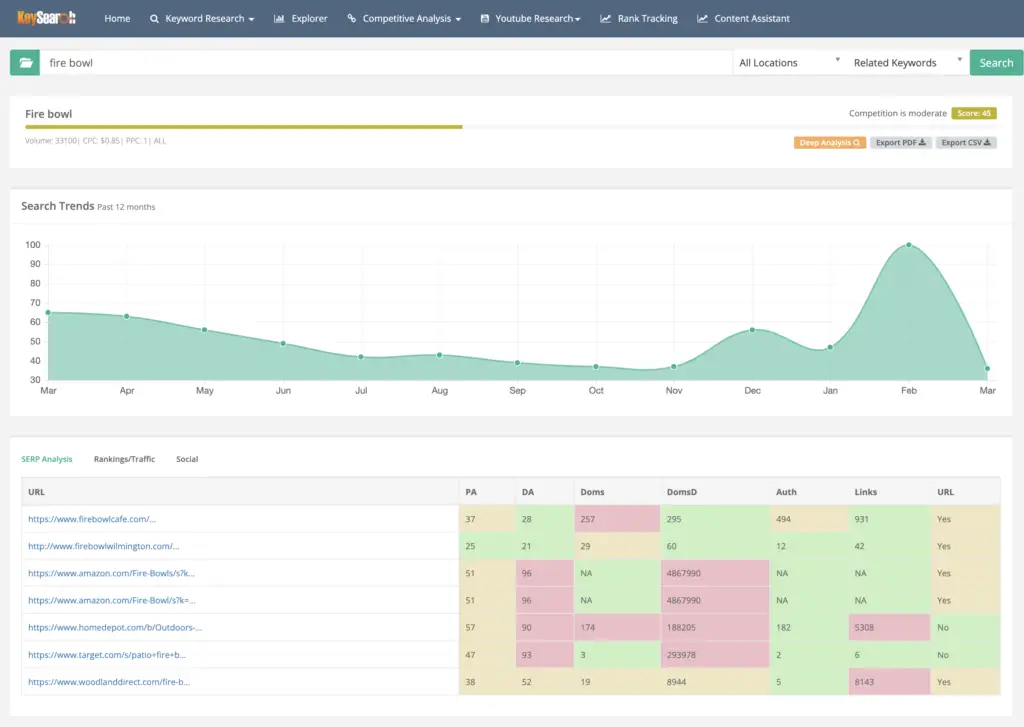
Highly-Focused Seo Content
There are two types of SEO – on-page and off-page.
On-page SEO strategies are vital for a successful blog. Tactics include:
- Optimize new blog posts for
- the target keyword
- variations on that term (i.e. if your target keyword was ‘fire pit’, you’d want to make sure you’re using ‘fire bowl’, ‘barbeque’ ‘bbq’ etc
- contextual words that add context to the keyword you’re targeting. If we continue the above example for fire pit, we could use ‘outdoor eating’, ‘al fresco dining’, ‘toasting marshmallows’ or ‘backyard camping’ to wrap your target keyword in some words and phrases that add context and feeling.
- Optimize the H1 title tag (also called the meta tag).
- SEO-driven H2, H3 title tags.
- Anchor text – whenever you link out to another page (on your own site or someone else’s blog) make sure that the text that links out to that place is descriptive rather than generic. For example ‘click here for more information’ is bad. Whereas ‘check out our guide to on-page SEO strategies for more information’ would be good.
Off-page SEO ideas include:
- guest posts
- doing interviews on podcasts
- link building
- social media promotion
Structuring Blog Posts Into Silos Or Clusters To Help Boost Their Strength
Content marketers will know the value of structuring blog posts into silos or clusters.
The way this works is to have a key search term within your niche as the main topic, and then a cluster of supporting blog posts, say around 25+, that will internally link to the main topic post.
Each blog post within the cluster can also link to each other. The authority benefits from all of these links compound to boost all of the posts within the cluster, making the sum greater than the value of the constituent parts.
Successful blogs are often organized along these lines and blogs structured this way tend to build authority much faster.
Continuous Development And Learning
Professional blogging is a fast-moving industry to be involved in. Things like social media, Google Analytics and SEO seem to change all the time, and on top of that are the dreaded Google algorithm updates and affiliate rate changes.
As such it’s vital that a professional blogger takes the time to keep up with the fast currents of digital change. Useful industry blogs, vlogs and podcasts include:
Great online courses to help build a successful blog include:
Link Building
Often a contentious issue amongst bloggers, link building is something that a professional blogger will often do to increase their website authority (PA and DA) with Google.
There are two types of links a blogger can build to their posts.
External Link Building
External link building is where another site links to your content. If that site has a good Domain Authority rating, then that signals to Google that your content is highly relevant within your niche.
Many professional bloggers will reach out to sites within their niche and highlight a blog post they’ve written that would be useful to readers of a post on the other site.
A link from a site like this can be very valuable in terms of boosting a post up the search engine results page (SERP) rankings, meaning more traffic (and money) for your blog. The more links you can attract, the more authority your site gains.
It can be difficult for sites in the early stages to attract external links. The soundest strategy is to create quality content that is highly useful within your niche. External links will – in time – head your way.
Writing guest posts for other blogs within your industry is also a great way to get links back to your site.
Internal Link Building
Not to be overlooked is the power of internal link building. This ties in closely with the cluster structure we looked at earlier. Roughly speaking 3 internal links equals 1 external link in Google’s eyes and most blogs will have lots of opportunities to cross-link from within.
Building An Email List
Most successful bloggers will have a compelling opt-in offer to enable them to start building an email list from their existing readers. This is truly a valuable asset – and once you have one you can begin to use email marketing to promote your latest blog posts direct to your audience.
Investing in Tools
Professional bloggers will invest money into some powerful tools that will help to escalate their online business. Spending just a little can save so much time and money in the long run that for many pro-bloggers, tools and services like these have become indispensable:
- AmaLinks Pro® – pro-affiliate marketers will use a tool like AmaLinks Pro® to sky-rocket their click-through rate (CTR). The higher this number the greater the chance of an increase in sales. Check out the results of the four split-tests we ran on real customer’s websites to see the incredible difference AmaLinks Pro® can make.
- a tool like Surfer is unbelievably useful when it comes to planning and writing highly tailored SEO content.
Hiring Services
Pro-bloggers often utilize the power of freelancers by:
- hiring a professional writer
- hiring a virtual assistant
- paying for images instead of free downloads that lots of other websites use
- hiring a graphic designer for bespoke graphics
FAQs
What Skills Do You Need To Be A Successful Blogger?
Now you know what a blogger is and how they spend their time. You may now be wondering whether you need a specific skill set to be a blogger.
Below is a list of the most useful skills you can have. However, in the true spirit of entrepreneurship, if you don’t have knowledge in any of these areas, you can learn how – often from free online courses. It will just take you longer to build your blog business.
- Content Writing + Copywriting
- Data analytics
- Web + Graphic Design
- Search Engine Optimization
- Social media marketing
- Photography
- Editing/Proofreading
- Email marketing
Does Running Your Own Blog Generate Passive Income?
Running your own blog doesn’t really generate passive income. The reason is that there is a lot of work that needs to go into creating a blog, writing blog posts that will rank on search engines and then analyzing the performance of existing posts and tweaking them to rank even higher.
This is what bloggers do all day. It’s a never-ending task of keyword research, content creation, publishing, promoting (via social media and email marketing), optimizing and tweaking. Make no mistake – there’s nothing passive about running your own blog.
How Do Bloggers Get Paid?
There are many ways a blogger can make money from their blog. Despite the amount of work it will take to start a blog and get some momentum behind it, the rewards can be spectacular. Done well, a good blog can become a full-time job and bring true financial freedom.
Ways that people make money from blogging include:
- recommending affiliate products
- selling online course
- selling digital products
For more inspiration check out our guide 25 Ways to Make Money Blogging.
What Type Of Bloggers Make The Most Money?
Interesting question… There are no real hard and fast rules here but Brandon Gaille has written a fascinating post delving into this very question and lifting the lid on blogging income across different niches.
Conclusion
Now that you understand what a blogger is and how they spend their time, what’s next for you?
If you’re new to the world of blogging but want to make money online, then one great way is to start a blog. If you want to build an affiliate business, before you start writing, check out our guide on how to Build a High-Performance Amazon Affiliate Website, where we explain all the steps you need to take to start blogging.
If you’re looking to take your next step towards becoming a professional blogger, sign up for our free Level-Up Masterclass series, where we’ll share tips to show you exactly what to do to take your online business to the next level…



